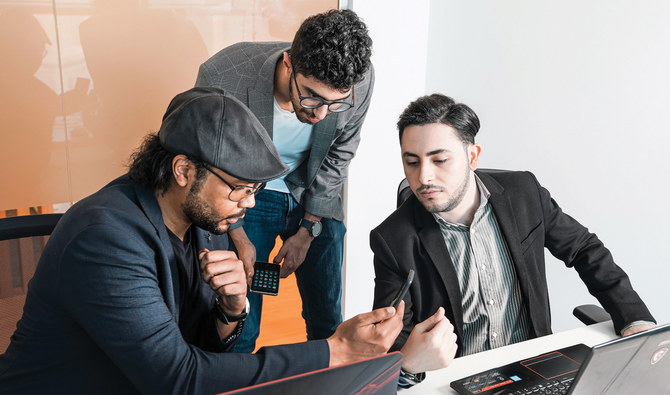
- ARAB NEWS
- 26 Apr 2024

Keith J Fernandez
DUBAI: Doctors can diagnose nutritional deficiencies in several ways, going by symptoms such as pale skin, brittle nails, muscle weakness and fatigue.
Now a team of engineering students from Ajman University in the UAE has made it possible for anyone to discover what vitamins their body lacks and take corrective action simply by using a smartphone app.
Vita-Cam employs a combination of artificial intelligence (AI) models to evaluate a person’s vitamin profile from photos of their eyes, lips, tongue and nails.
It then points out nutritional deficiencies and suggests corrective dietary changes and supplements. The app will not only tell you to eat your vegetables (and fruit) but explain why and what they can do for you.
Pending approval from the UAE Ministry of Health, it is expected to hit Google Play and iOS stores in early 2020.
“With recent advancements in research, the scientific community has become more aware of the relationship between vitamin deficiencies and many unfortunate health complications,” said Ahmed Saif Eldeen Khalil, an electrical engineering graduate student who created the app with a team of colleagues.
“But costly and skin-invasive detection methods may discourage individuals from seeking medical checkups, which provides an opportunity for technology to fill the gap and formulate alternative methods.”
His collaborators include fellow students Saif O.S. Alghlyayini and Mohamed Ait Gacem, and teaching assistant Wessam Shehieb.
Dubbed by Khalil a “portable doctor,” the app has snatched a number of awards since its inaugural presentation earlier this year.
In March, the team behind Vita-Cam won the UAE hackathon, and in October, it was selected as the UAE’s entry for the James Dyson Award, an international student design competition organized in 25 countries.
The winning team will receive 140,000 dirhams ($38,114) in cash. The UAE is the only Middle Eastern country to be represented, with the winner to be announced this month.
At present, the app tests for a broad spectrum of B vitamins, vitamins C and A, iron, zinc, calcium and magnesium levels, Alghlyayini said, adding that the team hopes to expand the detection range by integrating more body parts.
As is common with AI solutions, the app will broaden its coverage of vitamins and diseases with increased use.
“Our solution is not a replacement for medical consultation, but it is a tool designed to boost the community’s awareness of their nutritional needs and prevent health complications caused by untreated deficiencies,” Shehieb said.
UN data points to micronutrient deficiencies affecting some two billion people worldwide, many of whom suffer acute and chronic illnesses as a result.
In the Middle East and North Africa, malnutrition affects the most vulnerable communities in the least developed countries, as well as in advanced nations where overweight individuals do not get enough of the right nutrients.
Aggravating the problem is the shortage of medical professionals — the World Health Organization says the regional average of 2.3 healthcare workers per 1,000 people is insufficient to achieve even primary healthcare coverage.
Technological solutions such as Vita-Cam could go a long way towards bridging the gap by giving patients easy access to diagnostic tools. Several apps for diagnosing different conditions are in development around the world, but only a couple target similar conditions.
Vita-Cam is among the most innovative solutions and certainly the least expensive one so far.
The prototype, which was developed in three stages over six months, is compatible with most contemporary smartphones, whose cameras meet the minimum resolution requirements for a successful health analysis, even in variable light, says Gacem.
“We also included a set of instructions for the user to remove any obstacles that may interfere with the analysis, such as nail polish and eyewear, as well as an explanation of the minimum light intensity required.”
The launch version of Vita-Cam will be free, but feature advertisements from dietary supplements brands.
Future versions could be sold to medical institutions, and the team is working to establish cooperation with hospitals and research facilities, including the college of medicine and pharmacology at Ajman University.
Prof. Mustahsan Mir, executive director of Ajman University, believes the app will be a game-changer and perhaps even save lives.
“Unlike many other healthcare gadgets, Vita-Cam will be accessible to audiences all over the world for a free diagnosis of vitamin deficiency,” Mir said.
“Early diagnosis is the key to better public health.”
This report is being published by Arab News as a partner of the Middle East Exchange, which was launched by the Mohammed bin Rashid Al Maktoum Global Initiatives and the Bill and Melinda Gates Foundation to reflect the vision of the UAE prime minister and ruler of Dubai to explore the possibility of changing the status of the Arab region.